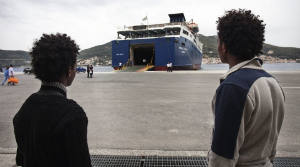UN uses BWA Eritrea evidence
The Baptist World Alliance (BWA) was one of several nongovernmental organisations whose findings were incorporated into a report issued by the United Nations (UN) on Eritrea in June.
 The BWA had highlighted human rights abuses, particularly those towards evangelical Christians, during the Universal Periodic Review (UPR) of the East African country by the UN in Geneva, Switzerland, in February 2014.
The BWA had highlighted human rights abuses, particularly those towards evangelical Christians, during the Universal Periodic Review (UPR) of the East African country by the UN in Geneva, Switzerland, in February 2014.
This, and other NGO findings, were referred to in the 500 page Commission of Inquiry on Human Rights in Eritrea that highlighted the "dire" human rights situation there. An estimated 5,000 people are fleeing the country each month, "forcing the outside world to take notice,” said Mike Smith, Chairperson of the Inquiry.
The BWA had gathered evidence through its Commission on Religious Freedom. It had alleged that there were between 2,000 and 3,000 religious prisoners in Eritrea, the majority being evangelical Christians. Religious prisoners, the BWA asserted, are frequently beaten and tortured, denied legal recourse and medical aid, and are held in deplorable conditions such as in underground cells and metal containers.
'For more than two decades the Eritrean regime led by President Isaias Afwerki and the Popular Front for Democracy and Justice has systematically committed flagrant abuses of human rights,' the BWA said in its complaint.
'While violations are broad, perhaps no community has suffered more thoroughly and completely than the numerous adherents of religious communities deemed unacceptable by the illiberal government, most especially evangelical Christians.'
While evangelical Christians are especially targeted, the BWA said other Christians have also experienced persecution. Abune Antonios, who is in his 80s, was removed from his position as Patriarch of the Eritrean Orthodox Church and has been under house arrest since 2006 without charges. The BWA submission to the UPR claimed that Muslims were also being persecuted.
After the UPR, the UN Human Rights Council established a Commission of Inquiry (COI) on Eritrea in June 2014 to investigate the widespread and systematic violations of human rights and fundamental freedoms in the nation, which gained its independence from Ethiopia in 1991 after a 30-year war for independence.
The BWA report, which provided background for the UPR, was included in the bibliography of the UN COI report as a background piece.
In addition, separate firsthand testimonies were used by the UPR. These testimonies were collected by Elijah Brown, a member of the BWA Commission on Religious Freedom, who had made visits to refugee camps in Ethiopia, which house refugees from Eritrea.
Brown, lead author of the BWA report to the UPR, was a professor at East Texas Baptist University and is now chief of staff of 21st Century Wilberforce Initiative, a Christian human rights organisation. The most recent of these firsthand testimonies were presented in February 2015 as part of the COI process.
One of these eyewitness testimonies stated, "The prison officials treated the Christian community differently than non-Christian prisoners. For instance, evangelical Christians in the prison were denied access to visits from families and friends. However, other faith groups were granted the privilege of seeing their family members and receiving food items."
Another eyewitness declared, 'As a follower of Christ, I was often not allowed to share a cell with another person. The guards were afraid I would proselytise. I did not have a Bible during this period. In fact, possession of a Bible would result in a punishment of several additional years of imprisonment. The officials kept telling me that I could not interact with others because I would spoil them and that my only chance for freedom was to betray Christ.'
'For two years the BWA Commission on Religious Freedom has been engaged on the situation facing persecuted individuals in Eritrea,' said Karen Bullock, professor of Christian Heritage and director of the Ph.D. Program at B. H. Carroll Theological Institute in Texas, in the US, and chair of the BWA Commission on Religious Freedom.
'It is clear that gross human rights violations have occurred and that some of these violations cross the threshold of crimes against humanity,' said Bullock. 'This report is the most comprehensive and detailed account of the violations perpetrated by the Eritrean government.'
Photo: A. D'Amato/UNHCR
Two young Eritreans wait to board a ferry at Samos Island, Greece. Growing numbers of Eritreans are seeking asylum in Europe.
Baptist Times, 13/07/2015